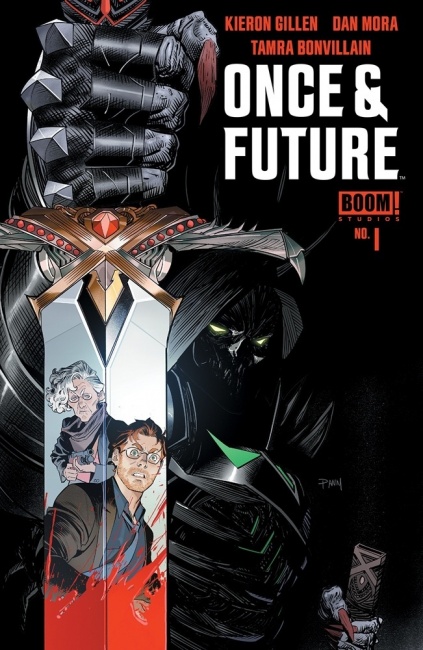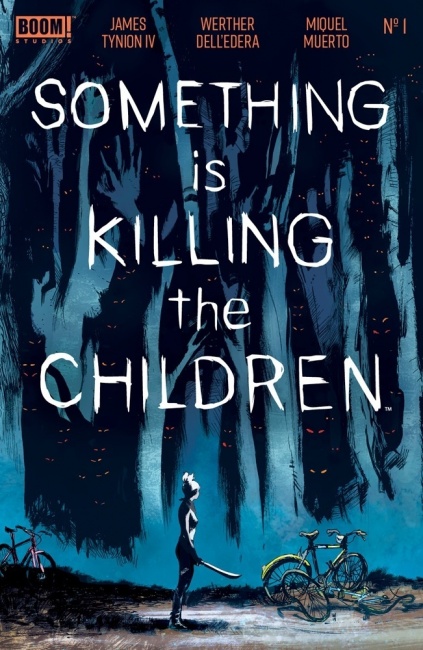We caught up with BOOM! Studios CEO Ross Richie and President of Marketing and Publishing Filip Sablik to talk about BOOM!’s 2019 and plans for 2020. In Part 1 of this two-part interview, we talked about the state of the comics and graphic novel markets, BOOM!’s strategy of publishing less to sell more, and a program that releases graphic novels early to comic stores and increases sales in both channels. In Part 2, we talked about returnability, expectations for market conditions in 2020, BOOM!’s publishing plans, and comics for kids.
ICv2: Let’s start out with your views of the current state of the comics and graphics novel market here at the end of 2019.
Filip Sablik: It's a pretty exciting time (I think most publishers would say that). There's a diversity and a variety of content that's out there; it’s probably one of the few times that we can really say that there's a comic or a graphic novel out there for virtually everyone, every audience. Clearly, there's a lot of energy from publishers getting into different categories and things like that.
I think, conversely, the market itself (if you look at the reporting that you've done and the numbers coming out of Diamond and Publishers Weekly, the direct market looks like it's probably either going to be flat or maybe up a little bit this year, which is certainly an improvement over the last two years and hopefully a sign of a market recovery. Although, I would note that it seems to me that the recovery is probably more tied to higher price points than increased units.
The book market (what I've seen is the macro numbers for publishing in general) seems to be kind of flat, maybe up a little bit. I haven't seen any fresh numbers come out for graphic novels specifically, but I suspect with two new Raina [Telgemeier] books and a whole bunch of Dav Pilkey, at the very least middle grade graphic novel publishing is probably going to be having a very good year.
I think some of the statistics you released around New York Comic Con in your white paper (see "Kids Graphic Novels Are Now Bigger than Superheroes, and Comic Stores Will Be #2 Channel in 2019") seemed to indicate that, as well. That seems to be the reality as we see it, but from the BOOM! perspective, it's been phenomenal year. In many ways, our best year yet.
We hit two new heights this year. We had our highest selling original comic book series, which was Once and Future, and we had our highest selling original graphic novel, which was R. L. Stine's Just Beyond. To be able to reach those new heights and successes in both the graphic novel space and the comic book space was really exciting.
We also saw an even larger lift with our original content in general. We had a 71 percent increase in our original launches this year, which is incredibly exciting and gratifying.
Are you talking about the number of releases or the sales on the releases?
Sablik: The sales, yeah.
On number ones?
Sablik: Our average sales on original releases are up 71 percent this year over last year.
Is that comics and graphic novels or just comics?
Sablik: Just looking at comics.
Ross Richie: We had the highest launching original graphic novel in the company's history. And the highest launching original number one series, first issue of the new series, original in singles, in comic book form. And we landed in the number four spot in November, behind Image. So, it's Marvel, DC, Image, and Boom!
We noted that (see "Marvel Pushes Up Comic Sales; DC Pushes Up Graphic Novel Sales").
Sablik: Pretty exciting. Right now, we're feeling pretty great about 2019.
Richie: It was a great year. It was our best year yet.
At the beginning of the year, you were talking about cutting your output about 15 percent in terms of number of SKUs for the year. Is that what happened?
Sablik: It absolutely is, and I think that's part of what makes up the growth we've seen at Diamond and at Simon and Schuster (which largely represent our direct market and our book market business). Being able to do that while we're cutting our line is really exciting.
Richie: If you listen to retailers, what retailers are saying is there's too many SKUs. Not just there's too many series on the market, but there's too many series that are not that strong. It's either product that isn't performing or it's series that can't garner a readership.
What we did this year was we cut the output by 15 percent and the first issue launches for the originals went up 70 percent. I think it was the right move for what the market was telling us, which is reduce your number of launches and do your launches better, and the market responded.
Ross, when we talked a little under two years ago you said that at that time book channel was about a third of your business, direct market about a third, and about a third for everything else. What are those proportions today?
Sablik: They are roughly equal at this point. We're about 50 percent direct market, 50 percent book market if you're just looking at those two channels. Obviously there's other revenue streams for the company.
So that's about the same as it was two years ago, it hasn't really changed?
Sablik: No. I think both of those have increased in terms of the total piece of the pie.
So "Other" is down as a percentage?
Sablik: As a percentage, yes, but not down on a gross revenue basis.
That's interesting that your growth is pacing between your two primary channels for print, because you've been able to go against the tide in the direct market and still keep up with the book market.
Sablik: Yes, I think that's exactly right.
What about your mix by format? Is that changing at all, in terms of periodicals versus graphic novels?
Sablik: This year it shifted more towards graphic novels, but we still publish more periodicals than graphic novels or collections.
We recently noticed that the Something is Killing the Children was a Discover Now title (released in the Direct Market before the book channel, see "BOOM! To Release Two Recent Comic Hits in Collections"). The only previous one we’d noticed was Mech Cadet Yu. Have you done any more of those? What is your evaluation of that program?
Sablik: We have done a few others. I knew we did one on Bone Parish and Coda last year. I'm sure I'm forgetting one or two others in the mix.
It's something that we've done selectively on single issue series that we notice have momentum in the direct market and we might have the release of the first collection further out than would allow a lot of the direct market partners to capitalize on that momentum.
That's generally where we've made that choice. In the case of Something is Killing the Children, it allows us to get a collection out into the direct market. In this case, I think we're looking at about three months ahead of where we had it slated to come out wide.
Thus far, what's been really interesting about this program is not only has it been successful in the direct market, meaning that those partners are able to capitalize on the momentum, typically we're releasing those Discover Now editions with the fifth issue or the sixth issue of a new series. They're able to pick up new readers.
It doesn't seem to have negatively impacted the book market in any way. In fact, if anything, we've seen a number of our book market partners come in stronger on those series. I think, in some fashion, the Discover Now edition helps drive awareness for the property.
Interesting. So you’re saying it's not cannibalistic, it augments sales across channels?
Sablik: Yes. Looking at not only average sales for a first volume collection from, let's say, the Studios imprint that's an original, but also comparing like comp titles, we see better numbers in both senses.
Click here for Part 2.

State of the Market, Publishing Less and Selling More, Early Release for Comic Stores
Posted by Milton Griepp on December 23, 2019 @ 9:22 am CT





